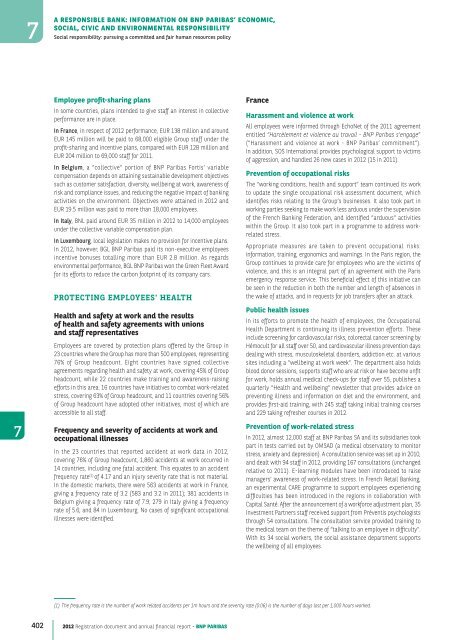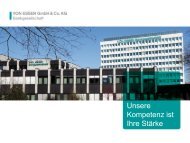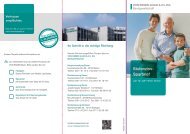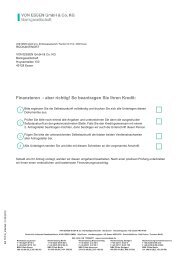2012 Registration document and annual financial report - BNP Paribas
2012 Registration document and annual financial report - BNP Paribas
2012 Registration document and annual financial report - BNP Paribas
- No tags were found...
You also want an ePaper? Increase the reach of your titles
YUMPU automatically turns print PDFs into web optimized ePapers that Google loves.
7ARESPONSIBLE BANK: INFORMATION ON <strong>BNP</strong> PARIBAS’ ECONOMIC,SOCIAL, CIVIC AND ENVIRONMENTAL RESPONSIBILITYSocial responsibility: pursuing a committed <strong>and</strong> fair human resources policy7Employee profit-sharing plansIn some countries, plans intended to give staff an interest in collectiveperformance are in place.In France, in respect of <strong>2012</strong> performance, EUR 138 million <strong>and</strong> aroundEUR 145 million will be paid to 68,000 eligible Group staff under theprofit-sharing <strong>and</strong> incentive plans, compared with EUR 128 million <strong>and</strong>EUR 204 million to 69,000 staff for 2011.In Belgium, a “collective” portion of <strong>BNP</strong> <strong>Paribas</strong> Fortis’ variablecompensation depends on attaining sustainable development objectivessuch as customer satisfaction, diversity, wellbeing at work, awareness ofrisk <strong>and</strong> compliance issues, <strong>and</strong> reducing the negative impact of bankingactivities on the environment. Objectives were attained in <strong>2012</strong> <strong>and</strong>EUR 19.5 million was paid to more than 18,000 employees.In Italy, BNL paid around EUR 35 million in <strong>2012</strong> to 14,000 employeesunder the collective variable compensation plan.In Luxembourg, local legislation makes no provision for incentive plans.In <strong>2012</strong>, however, BGL <strong>BNP</strong> <strong>Paribas</strong> paid its non-executive employeesincentive bonuses totalling more than EUR 2.8 million. As regardsenvironmental performance, BGL <strong>BNP</strong> <strong>Paribas</strong> won the Green Fleet Awardfor its efforts to reduce the carbon footprint of its company cars.PROTECTING EMPLOYEES’ HEALTHHealth <strong>and</strong> safety at work <strong>and</strong> the resultsof health <strong>and</strong> safety agreements with unions<strong>and</strong> staff representativesEmployees are covered by protection plans offered by the Group in23 countries where the Group has more than 500 employees, representing76% of Group headcount. Eight countries have signed collectiveagreements regarding health <strong>and</strong> safety at work, covering 45% of Groupheadcount, while 22 countries make training <strong>and</strong> awareness-raisingefforts in this area. 16 countries have initiatives to combat work-relatedstress, covering 63% of Group headcount, <strong>and</strong> 11 countries covering 56%of Group headcount have adopted other initiatives, most of which areaccessible to all staff.Frequency <strong>and</strong> severity of accidents at work <strong>and</strong>occupational illnessesIn the 23 countries that <strong>report</strong>ed accident at work data in <strong>2012</strong>,covering 76% of Group headcount, 1,860 accidents at work occurred in14 countries, including one fatal accident. This equates to an accidentfrequency rate (1) of 4.17 <strong>and</strong> an injury severity rate that is not material.In the domestic markets, there were 563 accidents at work in France,giving a frequency rate of 3.2 (583 <strong>and</strong> 3.2 in 2011); 381 accidents inBelgium giving a frequency rate of 7.9; 279 in Italy giving a frequencyrate of 5.6; <strong>and</strong> 84 in Luxembourg. No cases of significant occupationalillnesses were identified.FranceHarassment <strong>and</strong> violence at workAll employees were informed through EchoNet of the 2011 agreemententitled “Harcèlement et violence au travail - <strong>BNP</strong> <strong>Paribas</strong> s’engage”(“Harassment <strong>and</strong> violence at work - <strong>BNP</strong> <strong>Paribas</strong>’ commitment”).In addition, SOS International provides psychological support to victimsof aggression, <strong>and</strong> h<strong>and</strong>led 26 new cases in <strong>2012</strong> (15 in 2011).Prevention of occupational risksThe “working conditions, health <strong>and</strong> support” team continued its workto update the single occupational risk assessment <strong>document</strong>, whichidentifies risks relating to the Group’s businesses. It also took part inworking parties seeking to make work less arduous under the supervisionof the French Banking Federation, <strong>and</strong> identified “arduous” activitieswithin the Group. It also took part in a programme to address workrelatedstress.Appropriate measures are taken to prevent occupational risks:information, training, ergonomics <strong>and</strong> warnings. In the Paris region, theGroup continues to provide care for employees who are the victims ofviolence, <strong>and</strong> this is an integral part of an agreement with the Parisemergency response service. This beneficial effect of this initiative canbe seen in the reduction in both the number <strong>and</strong> length of absences inthe wake of attacks, <strong>and</strong> in requests for job transfers after an attack.Public health issuesIn its efforts to promote the health of employees, the OccupationalHealth Department is continuing its illness prevention efforts. Theseinclude screening for cardiovascular risks, colorectal cancer screening byHémocult for all staff over 50, <strong>and</strong> cardiovascular illness prevention daysdealing with stress, musculoskeletal disorders, addiction etc. at varioussites including a “wellbeing at work week”. The department also holdsblood donor sessions, supports staff who are at risk or have become unfitfor work, holds <strong>annual</strong> medical check-ups for staff over 55, publishes aquarterly “Health <strong>and</strong> wellbeing” newsletter that provides advice onpreventing illness <strong>and</strong> information on diet <strong>and</strong> the environment, <strong>and</strong>provides first-aid training, with 245 staff taking initial training courses<strong>and</strong> 229 taking refresher courses in <strong>2012</strong>.Prevention of work-related stressIn <strong>2012</strong>, almost 12,000 staff at <strong>BNP</strong> <strong>Paribas</strong> SA <strong>and</strong> its subsidiaries tookpart in tests carried out by OMSAD (a medical observatory to monitorstress, anxiety <strong>and</strong> depression). A consultation service was set up in 2010,<strong>and</strong> dealt with 94 staff in <strong>2012</strong>, providing 167 consultations (unchangedrelative to 2011). E-learning modules have been introduced to raisemanagers’ awareness of work-related stress. In French Retail Banking,an experimental CARE programme to support employees experiencingdifficulties has been introduced in the regions in collaboration withCapital Santé. After the announcement of a workforce adjustment plan, 35Investment Partners staff received support from Préventis psychologiststhrough 54 consultations. The consultation service provided training tothe medical team on the theme of “talking to an employee in difficulty”.With its 34 social workers, the social assistance department supportsthe wellbeing of all employees.(1) The frequency rate is the number of work related accidents per 1m hours <strong>and</strong> the severity rate (0.06) is the number of days lost per 1,000 hours worked.402<strong>2012</strong> <strong>Registration</strong> <strong>document</strong> <strong>and</strong> <strong>annual</strong> <strong>financial</strong> <strong>report</strong> - <strong>BNP</strong> PARIBAS





